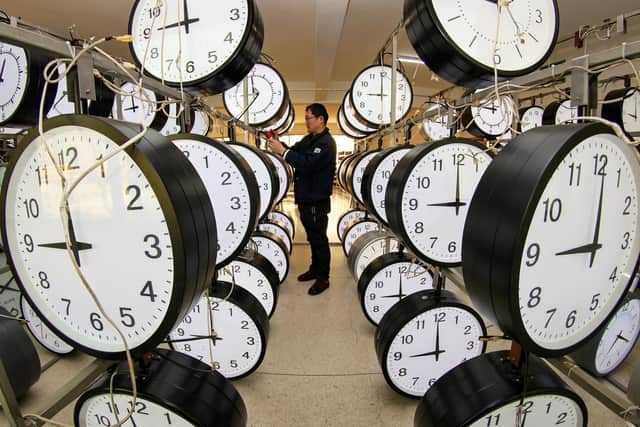Spring forward and leap back: is it really necessary for clocks to do all this jumping about? – Susan Morrison
and live on Freeview channel 276
I know, I can practically hear your eyebrows rise from here, but remember, I’m driving late at night, when the M8 remembers that it's supposed to be a motorway and not an automotive glacier. The satnav doodah tells me about road conditions and routes, and it also flashes up an estimated time of arrival.
On Saturday, it startled me by telling me that I wouldn’t see the front door for another two hours. Was the M8 shut? The last time they did that, I wandered about the Central Belt in the dark and began to fear I would never see home – a modern Flying Dutchman in a battered Citroen, cursed to rove Clackmannanshire forever (well, it would only take about 20 minutes) – until I spotted a tiny sign that said ‘Edinburgh’. Cue frantic checking of doodah to find out what the issue was until I realised. I had forgotten. The clocks were changing.
Advertisement
Hide AdAdvertisement
Hide AdNow, usually, we are the most organised of households when it comes to Time Travel Weekends. The Yorkshire husband is mildly obsessed with horology. He likes precision. He has been known to correct people who are sloppy with time.
This is an issue living in Scotland. We refer to time in broader terms, such as “jist efter”, or sometimes “the back o’ the hour”, which is any time between 30 seconds past the hour to about ten minutes past. “Jist afore”, likewise, is anything up to ten minutes to 30 seconds before the hour. Around quarter past and to, and any time around half past, is the “roon aboot” zone. As in “roon aboot hauf eleven”.
It drives him nuts. And he will correct. The birth of our daughter was a long, protracted and fairly dramatic event. The doctor, very satisfied and incredibly relieved to be faced with a healthy baby and a living mother, announced the time of birth as 10 o’clock. From just behind my head came a stern “it's actually 10.01”. It's on her birth certificate to this day.
So we are never surprised by the changing of the clock. For one thing, he tends to announce it on a regular basis, on a sort of countdown. “Clocks change in three weeks”, “Clocks change in two weeks”, you get the idea. It's like being followed around by a sort of 1950s public information film, only with a Yorkshire accent.
Advertisement
Hide AdAdvertisement
Hide AdTherefore, clock-changing weekend goes, well, like clockwork, really. All appliances are pre-set. The digital ones look after themselves, the watches put manually forward. Well, his are at any rate. I generally find myself stumbling about the next morning bleating “but what time is it really?” and turning up an hour late or early for about three days until he tells me what’s going on.


Last week, he developed a spectacularly nasty virus, and was floored. The Great Leap Forward into Spring was delegated to his second-in-command. That would be me. And that went about as well as you’d expect. All of which begs the question, why on Earth do we do it at all? Is it just to give time-obsessed Yorkshiremen something to do twice a year?
Comment Guidelines
National World encourages reader discussion on our stories. User feedback, insights and back-and-forth exchanges add a rich layer of context to reporting. Please review our Community Guidelines before commenting.
